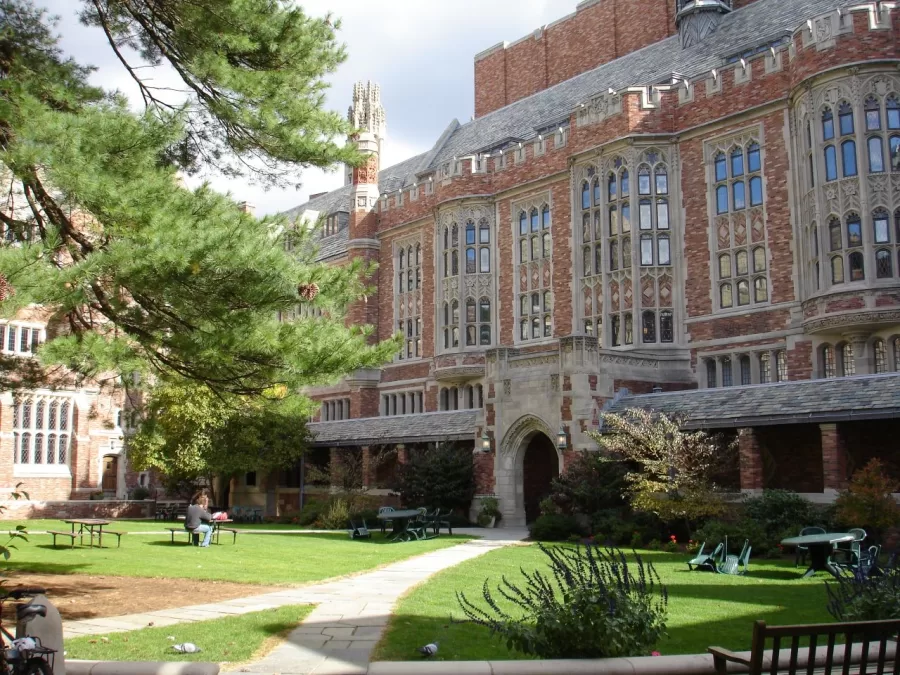Opinion | No LSAT makes law school much more unequal
Photo courtesy of Step / Wikimedia Commons
The Law School Courtyard at Yale Law School. As of recently, the LSAT is no longer required for admission into an ABA-accredited law school. Columnist Daniel Kibler argues that the LSAT should be required for admission, as it provides a barrier which prevents school’s from only accepting those that are wealthy.
Feb 9, 2023
The LSAT is often considered one of the most grueling exams in the world of academic admissions, but it has served a useful purpose over the years.
The LSAT is essentially the ACT or SAT for law school, and it has historically been the main standard by which prospective law students are judged. The test’s logic games and reading comprehension evaluations are designed to measure the basic skills needed for a legal career.
Until recently, that is. The test has been deemed as no longer required for admission into any ABA-accredited law school.
Tests are no fun for anybody. Preparing for and taking major exams are often looked back upon as the most stressful parts of an academic career. However, exams like the LSAT serve important roles.
The LSAT has been heralded as the “great equalizer” of law school admissions. There are classes and other materials people can pay for to help boost their scores, but the way the LSAT is designed often weeds out who should and shouldn’t be arguing in future courtrooms.
Get The Daily Illini in your inbox!
Those who are against the LSAT requirement claim that the privatized nature of the LSAT institution is inherently unequal. They claim that the time and money required to do well, alongside the standardized nature of the exam, breeds inequality and cuffs diversity. It has also been said that there is a bias toward those who have the time and money to prepare for it.
This comes alongside a general shift amongst academia toward a more “holistic” view of applications.
However, the attempt to override the LSAT is opening the door for bias — and possibly outright nepotism — to reign supreme in the realm of law school admissions.
In order to get into law school, one needs a high GPA. To get into the Top 14 — an informal term used in the legal community to refer to the 14 best-ranked law schools — anything short of perfect grades is essentially an automatic dealbreaker.
Most applicants to schools like Harvard, Stanford and Columbia are smart enough to know this and have those grades. Therefore, accounting for GPA can only get one so far.
With this being the case, admissions officers go to the next variables. Things like the quality of undergraduate education and extracurriculars come next — and this is where bias reigns.
Someone who had the time to lead five clubs at Princeton with internships lined up since high school will stand out above a highly qualified applicant who had to work 40 hours a week to feed himself because his parents were not doctors.
Undergraduate admissions are also prone to bias. Many elite private schools like Harvard have legacy referrals that gatekeep the institution, along with the admission scandals for undergraduate schools that are becoming more and more common.
The school that someone attended for their undergraduate degree can only go so far in evaluating one’s potential in a legal career.
It is here where the LSAT has served as the great equalizer. The students from wealthy suburbs — groomed from a young age to excel academically — have to take the same test as those from poor areas trying to follow a dream. People who never had advantages growing up are able to stand up to those born with everything.
The LSAT is the last thing stopping elite law schools from only admitting applicants who are “more qualified” due to the massive amounts of resources they were born with. Such a move is inherently classist, and perhaps that is the point.
I argue, then, that the LSAT must be required for law school admission. We cannot let those with the keys to education claim things like “diversity” and “equality” while doing things that would destroy both.
Tests suck, but they have a purpose. The LSAT is designed to keep legal education meritocratic. Without it, our legal system will only decay.
Daniel is a senior in LAS.






